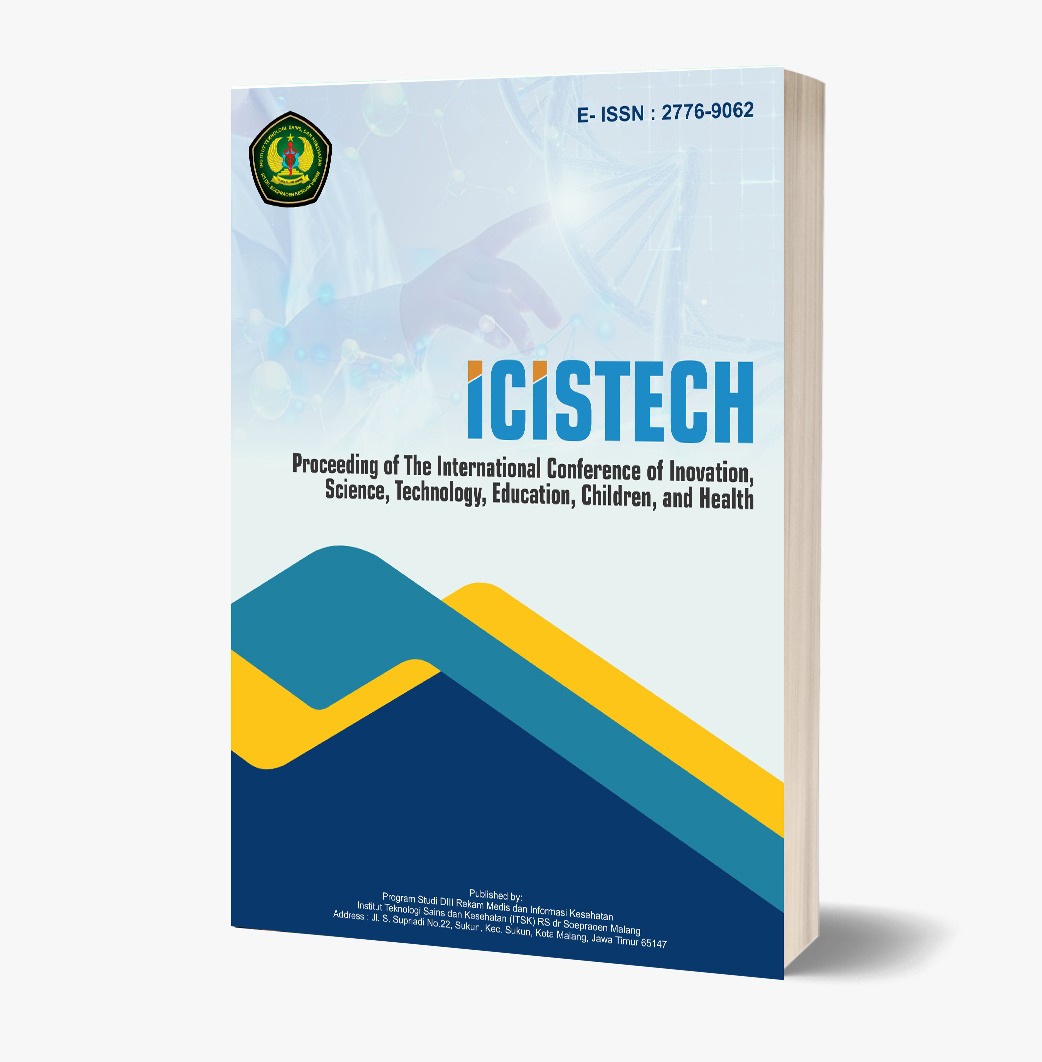The Connection between Individuals' Knowledge Levels and Their Interest in Using IUD Contraceptive Devices
DOI:
https://doi.org/10.62951/icistech.v5i1.173Keywords:
Contraception, IUD, KnowledgeAbstract
Population policy in Indonesia represents a key government effort to regulate and control population growth. One of the most significant strategies in managing population growth is Family Planning, which helps reduce the rate of fertility and support healthier families. Among the various contraceptive methods, the IUD (Intrauterine Device) is a non-hormonal option that is commonly used by Fertile Age Couples (FACs). The goal of this study was to explore the relationship between the level of knowledge and the interest in the IUD contraceptive method among couples in the Puskesmas Pugaan area. This research employed an analytical approach using a cross-sectional design. The population for this study included all fertile couples in the Pugaan Health Center area. A purposive sampling technique was applied, selecting a sample of 20 participants. Data were collected through questionnaires, and the data were analyzed using the chi-square test with the SPSS version 25 software. The study found that 12 participants (60%) had good knowledge of IUDs, 5 participants (25%) had sufficient knowledge, and 3 participants (15%) had poor knowledge. Regarding interest in using IUDs, 16 participants (80%) expressed an interest, while 4 participants (20%) were not interested in using the IUD. The chi-square statistical test yielded a P value of 0.000 (P < 0.05), indicating a statistically significant relationship between knowledge level and interest in the IUD contraceptive method. In conclusion, this study demonstrates that there is a significant relationship between the level of knowledge and the interest in using IUD contraception at Puskesmas Pugaan. These findings suggest that improving the knowledge of couples about contraceptive methods like the IUD may play a crucial role in increasing interest and usage rates, contributing to more effective population control efforts
References
acceptors at the Nurjaimah clinic, Gebang sub-district, Langkat district. Jurnal Prioritas Nursing, 1(1).
Alfitri, R., & Yunita, A. (2021). Accuracy of injectable KB acceptor re-visit during the COVID-19 pandemic in PMB Yayuk Handayani Wagir District Malang Regency. Placentum: Jurnal Ilmiah Kesehatan dan Aplikasinya, 9(3), 59–64. https://doi.org/10.20961/placentum.v9i3.54666
Arbaiyah, I. (2021). The relationship between husband's knowledge and support with the use of IUD contraception in Balakka Village in 2020. J Kesehat Ilm Indones, 6(2), 86–94. https://doi.org/10.51933/health.v6i2.575
Asi, M., Kurniawan, F., Sutriningsih, & Irawati, E. (2023). Family planning services (1st ed.). In A. Asriati & F. Realita (Eds.), EUREKA MEDIA AKSARA.
Astuti, F., Retnaningsih, R., & Indriati, I. (2024). Use of IUD contraception devices in family planning acceptors at Panacea Clinic Balikpapan. J Kesehat Masy Inov, 7, 1–5.
Central Statistics Agency of East Java Province. (2023). PUS active KB participants IUD, MOW, MOP.
Destyowati, M. (2013). The relationship between the level of mother's knowledge about IUD contraception and the interest in using IUD contraception in Harjobinangun Village, Grabak District, Purworejo Regency in 2011. J Community Health, 8.
Entoh, C., Zulfitriani, Z., Longgupa, L. W., Sitorus, S. B. M., Nurfatimah, N., Ramadhan, et al. (2021). Do husband's knowledge and support affect the low use of IUD contraceptive methods among KB acceptors? J Health Sciences, 15(2), 189–195. https://doi.org/10.33860/jik.v15i2.476
Hipson, M., & Handayani, S. (2024). Use of 3-month injection contraception based on introduction: Contraception comes from the word ‘counter’, which means to prevent or hinder, and ‘conception’, which means fertilization or the meeting between egg cells and sperm. Jurnal Kesehatan, 9, 384–394.
Jasni, N., Nadeak, Y., & Manullang, R. (2022). Factors associated with low use of intrauterine contraceptive devices. Institut Teknol Kesehatan dan Bisnis Graha Ananda [Internet], 6(1), 728–734. Available from https://journal.universitaspahlawan.ac.id/index.php/prepotif/article/download/3426/2704
KOMNAS Women. (2023). Realizing the rights of all women to choose and get access and services of contraceptive devices.
Ministry of Health of the Republic of Indonesia. (2019). Family planning.
Niken, M. (2018). Breastfeeding plan and contraceptive selection in pregnant women in Yogyakarta. Jurnal Kesehatan, 2, 2–6.
Octavi, F., Della, L., & Munir, R. (2022). Relationship between maternal knowledge level and interest in using intrauterine contraceptive devices (IUD) after delivery. J Midwifery Care, 2(02), 133–142. https://doi.org/10.34305/jmc.v2i2.419
Oktarina, R. (2022). The relationship between education and mother's knowledge regarding the selection of IUD (intrauterine device) contraception. Cendekia Med J Stikes Al-Ma'arif Baturaja, 7(1), 26–33. https://doi.org/10.52235/cendekiamedika.v7i1.104
Purba, L. (2019). Science about family planning.
Saifuddin, A. (2019). Practical guide to contraceptive services (2nd ed.). EGC.
Satria. (2022). Relationship between knowledge level, husband's support, and mother's attitude with the use of IUD contraception. Jurnal Ilmiah Univ Batanghari Jambi, 22(1), 166–170. https://doi.org/10.33087/jiubj.v22i1.1772
Suparman, E. (2021). Emergency contraception and its problems. Med Scope J, 3(1), 94–104. https://doi.org/10.35790/msj.v3i1.34908
Syari'ah, A., & Hamidah, T. (2024). Childfree and the law of using contraception in a contemporary fiqh perspective. AL-AQWAL: J Kaji Huk Islam, 3(2), 103–117. https://doi.org/10.53491/alaqwal.v3i02.1252
Tripertiwi, S., Mardiana, N., & Nurrachma, E. (2019). The relationship between mother's employment status and mother's interest in using IUD contraception at Bengkuring Samarinda Health Center in 2019. Thesis of the East Kalimantan Ministry of Health Polytechnic, 1–112.
Downloads
Published
How to Cite
Issue
Section
License
Copyright (c) 2025 Proceeding of The International Conference of Inovation, Science, Technology, Education, Children, and Health

This work is licensed under a Creative Commons Attribution-ShareAlike 4.0 International License.













